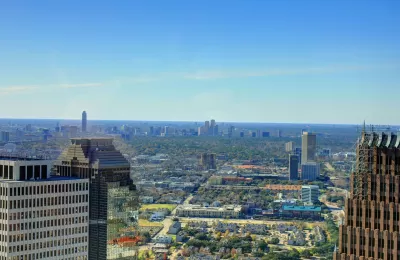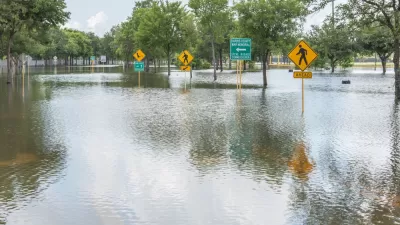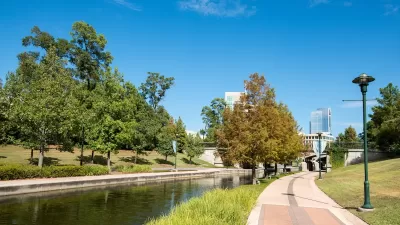Houston's director of Transportation and Drainage Operations wants to see more sustainable development in the city that has historically depended on freeways as its critical infrastructure.

Earlier this year, Houston experienced "one of the worst natural disasters in Texas history as a severe winter storm crippled infrastructure across the state." Veronica O. Davis, the city's new Director of Transportation and Drainage Operations, writes that the city "finds itself at a critical point."
Houston ranks as "one of the nation’s most unsafe for pedestrians and there is a wide gap between neighborhoods’ access to resources," says Davis. "For decades, federal transportation policy has added to these challenges by disproportionately encouraging and subsidizing the growth of one type of transportation infrastructure: highways, which receive 80 percent of federal transportation funding in the U.S." But there is another way. "By offering many ways to get around, we can help reconnect divided neighborhoods, provide more access to opportunity for all Houstonians, lessen racial inequities, and, with less concrete, have our neighborhoods flood less often." Davis says the city is making progress. "With the Resilient Houston plan, we are investing in drainage and green infrastructure to manage stormwater from major and minor storms. And under Mayor Sylvester Turner’s Complete Communities initiative, we are investing in Houston’s under-resourced neighborhoods — right-sizing roads to make them safer for people walking and biking, and working to reduce flooding."
But according to Davis, the city needs help from the federal government. Pointing to a proposal included in the House reconciliation package which includes $10 billion in funding for buses in underserved neighborhoods and "$4 billion to repair the historic damage to Black and low-income neighborhoods caused by highways that intentionally destroyed thriving places and widened segregation," Davis says "these targeted measures could be transformative, tying funding directly to goals, and giving local governments a greater say in what will most benefit their neighborhoods." To make progress on climate change and create a greener, more equitable city, "we must focus on transportation. We must take new approaches." The federal dollars could be a huge step in that direction.
FULL STORY: Opinion: Infrastructure can pave the way to a greener, fairer Houston

Alabama: Trump Terminates Settlements for Black Communities Harmed By Raw Sewage
Trump deemed the landmark civil rights agreement “illegal DEI and environmental justice policy.”

Planetizen Federal Action Tracker
A weekly monitor of how Trump’s orders and actions are impacting planners and planning in America.

How Atlanta Built 7,000 Housing Units in 3 Years
The city’s comprehensive, neighborhood-focused housing strategy focuses on identifying properties and land that can be repurposed for housing and encouraging development in underserved neighborhoods.

In Both Crashes and Crime, Public Transportation is Far Safer than Driving
Contrary to popular assumptions, public transportation has far lower crash and crime rates than automobile travel. For safer communities, improve and encourage transit travel.

Report: Zoning Reforms Should Complement Nashville’s Ambitious Transit Plan
Without reform, restrictive zoning codes will limit the impact of the city’s planned transit expansion and could exclude some of the residents who depend on transit the most.

Judge Orders Release of Frozen IRA, IIJA Funding
The decision is a victory for environmental groups who charged that freezing funds for critical infrastructure and disaster response programs caused “real and irreparable harm” to communities.
Urban Design for Planners 1: Software Tools
This six-course series explores essential urban design concepts using open source software and equips planners with the tools they need to participate fully in the urban design process.
Planning for Universal Design
Learn the tools for implementing Universal Design in planning regulations.
Jessamine County Fiscal Court
Caltrans
Institute for Housing and Urban Development Studies (IHS)
City of Grandview
Harvard GSD Executive Education
Toledo-Lucas County Plan Commissions
Salt Lake City
NYU Wagner Graduate School of Public Service





























